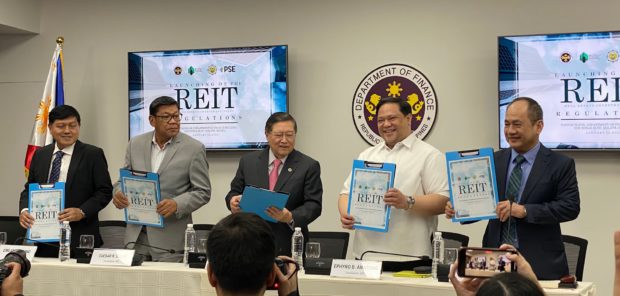
Capital market regulators launch the new REIT framework.
Eleven years since the enactment of the Real Estate Investment Trust (REIT) law, the Philippines has finally come up with an implementing framework that is acceptable to the capital market.
The Department of Finance (DOF), Securities and Exchange Commission (SEC), Bureau of Internal Revenue (BIR) and Philippine Stock Exchange (PSE) launched on Monday coordinated rules on securities and revenue regulation as well as public listing of REITs. They removed stringent tax and minimum public ownership (MPO) requirements that prevented the rise of REITs as a powerful instrument to tap retail investors and recycle capital.
As a new asset class, REIT gives investors the option to invest directly in the finished products that are already earning money—such as residential and office units, hotels or shopping malls or even infrastructure ventures like toll roads and power plants —and not just the property developer itself. This was meant to attract dividend-seeking investors because the Philippine REIT law of 2009 required the distribution of 90 percent of income annually.
On the MPO, the SEC had earlier set the requirement at 40 percent at year one which would have further gone up to 67 percent by year three. The government agreed to ease the MPO requirement to 33 percent for as long as funds raised using a REIT listing would be reinvested locally within a period of one year.
The SEC issued amendments to the implementing rules and regulations (IRR) of the REIT Act of 2009 while the DOF and the BIR released a new revenue regulation updating the tax treatment of REIT transactions, specifically on tax incentives for REIT companies and the exemption from value added tax of the transfer of property to a REIT company in exchange for its shares of stocks.
The BIR also removed the requirement for a REIT to place in escrow, the income tax collectible from the REIT on dividends declared and deducted from its taxable income, as well as the 50 percent documentary stamp tax (DST) given as incentive on the transfer of real property to the REIT.
For its part, PSE also issued amendments to the listing rules for REITs that provide the appropriate mechanisms, internal controls, and procedures to monitor the compliance of REITs with the applicable rules and regulations.
Finance Secretary Carlos Dominguez III said the listing of REIT companies on the stock exchange would create “a secure opportunity for small investors to participate in the growth of property development in the country,” and is “a big step forward for greater inclusiveness in the financial system.”
“We likewise wanted to be sure that the large investment funds to be raised using this mechanism will be reinvested exclusively within the country’s real estate and infrastructure sector. The reinvestment requirement is the regulatory framework, which ensures that the funds invested by Filipinos will stay in our domestic economy and will contribute to the improvement of our country’s infrastructure, rather than the benefits being squirreled away to other markets and countries,” he added.
SEC chair Emilio Aquino said the amendment of the REIT implementing rules would “allow Filipinos to invest in the real estate market without owning actual property or the disadvantages of high transaction costs and illiquidity.”
“REITs are a welcome addition to our product offerings as they will help our market become more competitive in the region,” PSE president Ramon Monzon said.
“Potential issuers and investors, both retail and institutional, have been looking forward to the introduction of REITs in the country given the benefits of both listing and investing in this new asset class.”
To further facilitate the formation of REITs in the country, the SEC enhanced the qualification requirements of REIT fund managers and property managers, to ensure their independence and specify minimum requirements for their organization, among others.